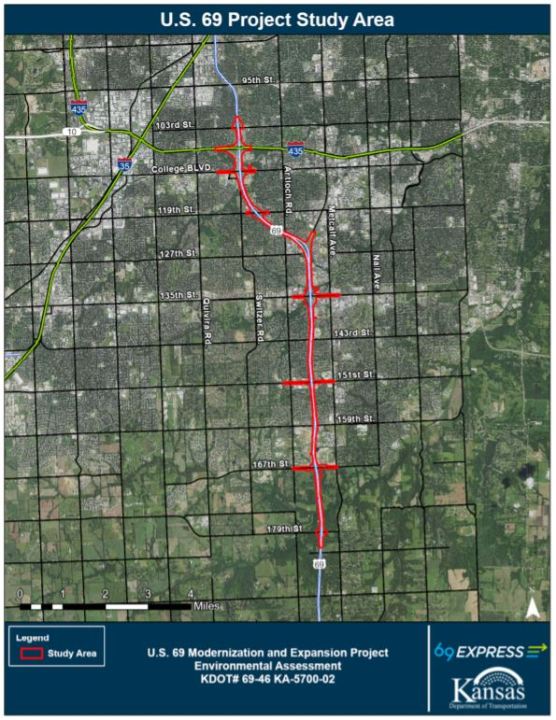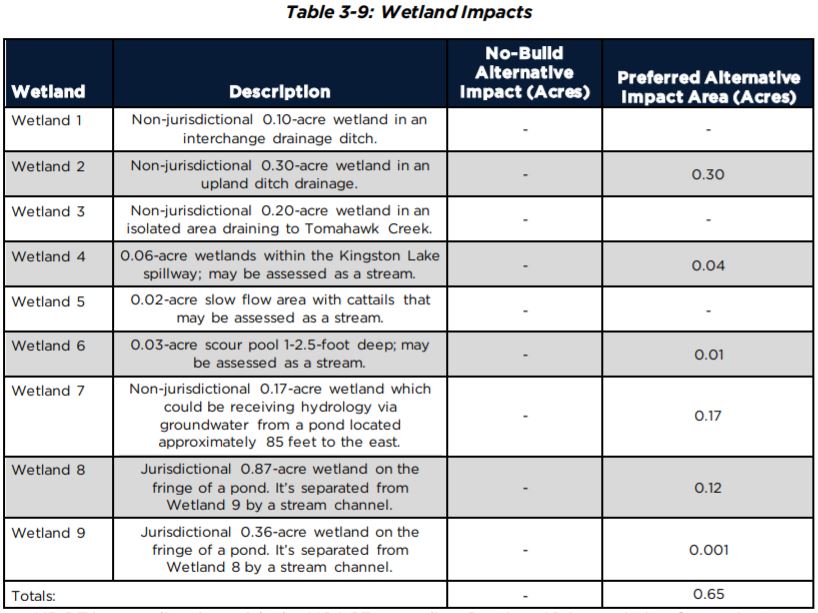OVERLAND PARK (Kan.) After a year-long review of the situation, the Kansas Department of Transportation has released the results of an Environmental assessmentRelated to the U.S. 69 Highway Toll Project.

The study covers approximately 10 miles of roadway, from south of 179th Street in Overland Park to just north of 103rd Street.
The study compares potential environmental and infrastructure impacts along the highway that could result from traditional road widening or the express toll lanes project. It also considers the possibility of leaving the roadway as it stands (no build alternative).
Traffic congestion
Based on KDOT crash data from 2015 to 2019, a traffic study was done for the 69 Corridor.
The data shows that there were approximately 1,712 accidents on U.S. 69 Highway from 103rd Street to 179th Street during the four-year period. There were four deaths, 343 injuries sustained in crashes and 1,365 property damage.
According to the study, 6 out of 10 segments of U.S. 69 Highway surpass the statewide average for fatal and total crashes when compared to other highways in urban areas.
FHWA developed a future crash analysis in order to project the changes in crashes between 2019 conditions and potential conditions for 2050, if improvements are not made.
Crash rates are expected to rise by approximately 65% if the corridor is not improved by 2050.
The study also estimates that northbound traffic between 179th Street 103rd Street during peak morning travel times could increase from a 15-minute commute to an 81 minute commute by 2050 if there are no improvements. The southbound traffic flow during peak evening travel times could rise from 13 minutes to 7 minutes by 2050.
Traffic Noise
A noise analysis for the toll-lane project showed 23 noise sensitive locations throughout the project. It recommended 14 noise walls be placed in various locations on the highway.
Overland Park residents can begin receiving ballots next month to weigh in. The toll lane project was increased by approximately $30 millionTo cover the cost to build new noise reduction walls along this corridor.
If approved, 11 noise barriers would be built as part the first phase. The other four will be added later. According to the study noise walls could be installed along the corridor and affect approximately 1,790 people.
Parks and Trails: Impacts
KDOT anticipates that there will be several temporary closures or detours in Overland Park’s parks and trails during construction.
Construction will have an impact on parks and trails, including:
- Bike Lane 143rd Street
- Trail to 143rd Street
- 151st Street Trail
- Brandon Place Trail.
- Corporate Woods Trail
- Grant Street Bike Lane
- Indian Creek Hike and Bike Trail
- Indian Valley Park
- Kingston Lake Park
- Lowell Avenue Trail
- Nottingham South Park
- Tomahawk Creek Trail
- U.S. Trail 69
Environmental impact
KDOT conducted an investigation in June to identify 2.13 acres worth of wetlands and approximately 9.990 linear feet of open streams channels within the study region. The toll lane will impact approximately 0.65 acres in wetlands.

Based on a January 2021 Kansas Biological Survey (KBS), Natural Resource Planner search, no records of endangered or threatened species were located within the project area.
KDOT conducted asbestos and lead testing on bridges within the project area. Antioch Road bridges were not found to have asbestos. However, bridges crossing U.S. 69 (Bridge #0122 & Bridge #0284), tested positive for lead paint.
According to the study the two bridges will not be affected by the toll-lane project.
Construction on the new toll lane project will begin in mid-2022. New toll lanes will be open for use in 2025.
KDOT will take public comments on the Environmental Assessment up to January 22, 2022. KDOT welcomes any questions or comments through the Website for 69 Express
Sugest a Correction


